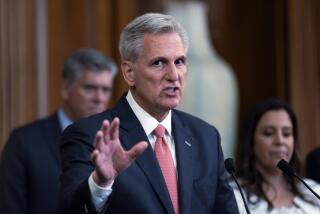The surgery begins
- Share via
The Senate Finance Committee put the final touches on its healthcare bill early Friday morning, and soon Democratic leaders will begin reconciling it with a more costly alternative approved by the Senate’s health panel. When they’re done, they’ll face the toughest test yet for advocates of comprehensive reform: getting past a Republican filibuster on the Senate floor. Majority Leader Harry Reid (D-Nev.) has threatened to invoke a procedure typically reserved for budget-related bills to allow healthcare legislation to advance with a simple majority, not the 60 votes required to end a filibuster. But 60 is the right threshold for this far-reaching measure because it would force sponsors to build a broader consensus, particularly on three core issues now dividing liberals and moderates: how much to subsidize policies for the uninsured, how to pay for the subsidies and how to promote competition among insurers.
This will be an exercise almost exclusively for Senate Democrats, because Republicans -- unlike doctors, hospitals, drug makers, insurers and many analysts -- don’t support such sweeping changes. The GOP has a number of good ideas for improving healthcare, yet Republicans on the Senate finance panel devoted most of their efforts to preserving the status quo.
Finance Committee Chairman Max Baucus (D-Mont.) narrowed the differences among Democrats on the affordability issue by amending his original proposal to increase the insurance subsidies for lower-middle-class families. That’s an important step. As critical as an individual mandate may be to slowing the growth in healthcare costs, it’s just not reasonable to require people to buy policies they can’t afford. Yet the bill should go further to boost affordability by giving individuals more choices of pared-down plans that would require them to pay a greater share of their routine healthcare costs.
The intraparty split is wider on proposals for an optional government-run insurance plan for individuals. Baucus’ committee endorsed consumer insurance cooperatives, but liberals favor a national plan with more clout to drive down rates. Reform advocates should explore more alternatives, such as building on state high-cost insurance pools, creating regional versions of the L.A. Care Health Plan or encouraging novel new nonprofits through competitive bidding.
Finally, Baucus’ bill would pay for the subsidies in part by imposing a new tax on insurers that offer high-end plans. It’s an indirect way to raise the price of gold-plated policies that encourage overconsumption of healthcare services. A more honest approach would be to reduce the break taxpayers receive for such plans. Democrats have resisted doing so because it would violate President Obama’s pledge not to raise taxes on the middle class. But everyone gains from healthcare reform, and everyone should contribute.
More to Read
Get the L.A. Times Politics newsletter
Deeply reported insights into legislation, politics and policy from Sacramento, Washington and beyond. In your inbox twice per week.
You may occasionally receive promotional content from the Los Angeles Times.










